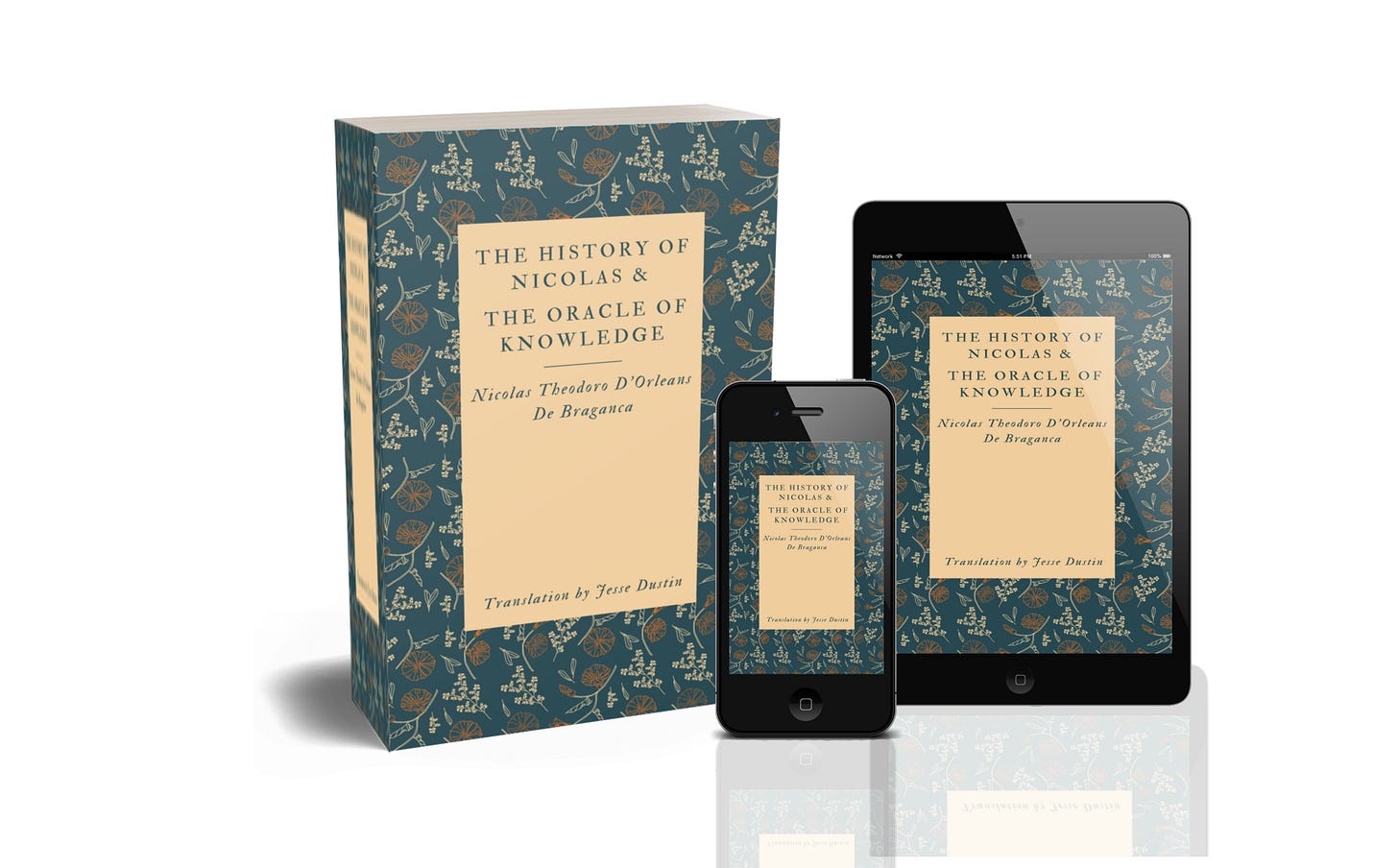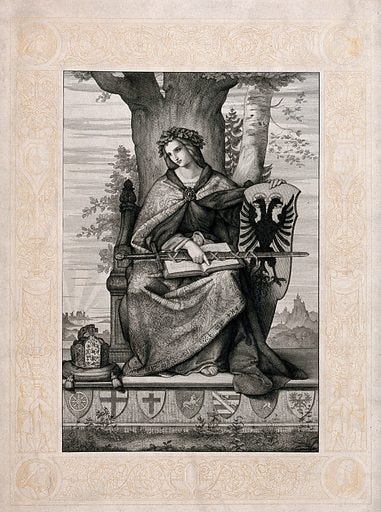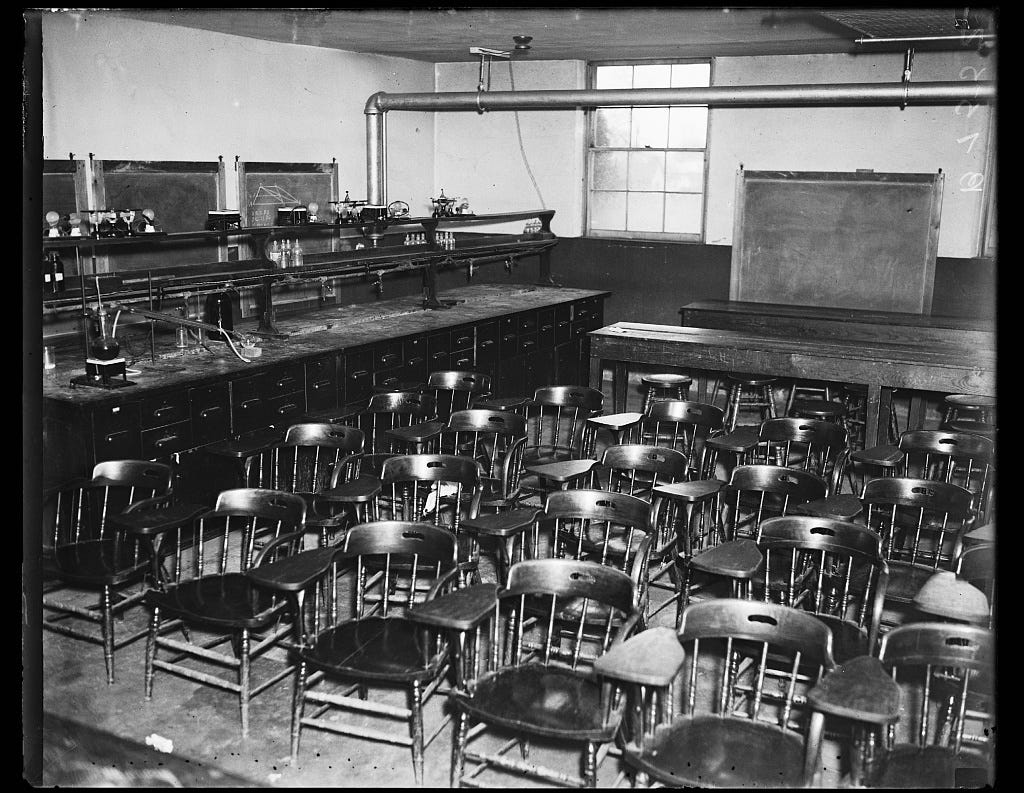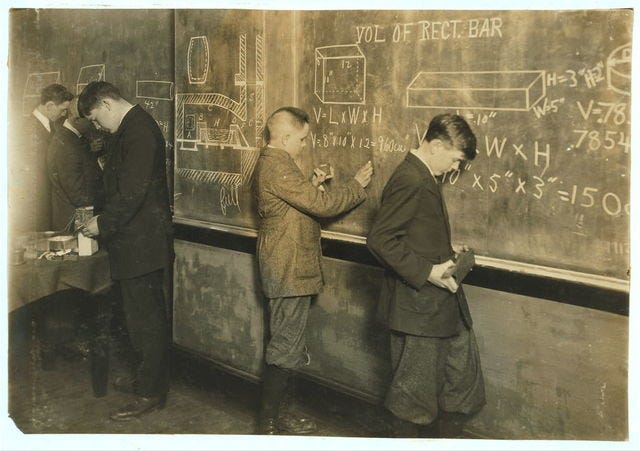The History of Nicolas and the Oracle of Knowledge. . .
Prologue & Part 1
As promised I am dribbling out parts of my first book. However, instead of my original idea of weekly chapters I am dropping it in its 3 original parts.
Without further ado I now present to you; Part 1 of The History of Nicolas and the Oracle of Knowledge. . . (for those ruined by smartphones and cannot read, check out the Part 1 audiobook by the Unism Channel)
Prologue
While this story has been restored to the best of our scholars abilities, the History it emerged from has for the most part been entirely lost to us. We know not who this Nicolas was, and have only the faintest historical grasp on the persons, places, and events he so eloquently described within this archaic work.
As you, the reader, will no doubt be aware, we have lost nearly all records of and information on that bygone period which some historiographers are calling “the final Dark-Age.” Though, unlike any of its predecessors, the inhabitants of this penultimate Dark Age supposedly had vast storehouses of knowledge to pull from, novel communication methods and technology unheard of today. The following translation comes from an old-language manuscript which was found, as the story goes, buried in a crag beneath an old oak tree, and has been re-translated for you, the humble reader. We have no way to gauge the veracity of this story, other than to say that the educated amongst us today very much believe this account to be true and you should decide for yourself as to the integrity of these chronicles.
The Beginnings
Once upon a glorious time, there was a boy named Nicolas, who grew up in the forest amongst the tall pines and ancient oak trees. He was a thoughtful, earnest and curious young boy, questioning everything around him and always seeking to understand how things came to be. As a small child he would often sit in his father's wood-shop, fetching various tools and asking about all the creations his papa had carved and whittled away at for all of the local townsfolk. When Nicolas was not helping his father, he would spend many a glorious day bathing freely in the crisp, cold waters of the Swift River, or frolicking with his siblings through the lush green field-brush and pastures of their idyllic homeland. It was a special time for young men like Nicolas in those days. His world was much smaller and simpler. His path to fulfillment and thus true success in life ― like his father’s success in fashioning grand creations out of wood ― was much closer at hand and appeared far easier to grasp.
Some would describe Nicolas as the spitting image of his father, whose trade was that of a draftsman and a carpenter. He was a tall man who had a chiseled, strong face with captivating blue eyes, which would stare intently and thoughtfully at his works. Nicolas would watch his father as he toiled over his wooden creations, like a father would toil over his own children, working his immaculate pieces and handicrafts to completion. Nicolas excelled and seemed at ease during these early years, as it seemed he was at peace in the small hamlet he was born into. He would bask in the sweet serenity of growing up within the simplest foundations of nature and humanity.
In Elementary school Nicolas was an exceedingly accomplished pupil, and was popular with the other schoolchildren as well. These young tikes studied the foundations of counting, reading and writing, and as they reached each new pinnacle of learning they began to understand the basics of arithmetic and classic literature, such as their past generations, and even Nicolas’ own father had once learned. As he grew more educated and aptly prepared for greater things in life, it was determined by his teachers and parents that he was indeed a bright and capable young lad. And so, when he was thirteen years old, he was sent away to live at a boarding school for gifted students, called the Academy.
At first, Nicolas struggled to fit into this foreign world, as he came from much humbler beginnings. He would often be found sitting alone on the Quad, under one of the tall oak trees, on the thick patchwork of green grass, caught up in reading his favorite books. For the first time in his young adulthood, he seemed to show a solitude and melancholy nature; a sadness borne of being separated from the idyllic places from which he had been raised.
At the Academy he lived amongst the young, gifted scholars of the time, who travelled from all across the world to be educated there. There were the children of Princes, Business Tycoons and Foreign dignitaries, Asians & Jews and all sorts of gifted children. Over time in the dormitories where the children slept and studied at night, Nicolas would make a few long-lasting friendships and he seemed to be partially content in his newfound place in the world. He and his friends would often stay up late into the evening, dreaming of what adventures and successes lay in wait for them on their journey to becoming adults. Each one promised the other that they would stay in touch during those later triumphant years.
At the time a great upheaval was taking place all around them. A new innovation was appearing in the classrooms across the country, and it would soon come to change the nature of mankind forever. It was called the “Oracle of Knowledge” and it was an amazing creation, for it contained all the worldly knowledge one could want. This new Oracle was a modern encyclopedia, map and thesaurus all-in-one, and it featured a way to gather expertise from a whole range of topics in just mere moments. The teachers greatly encouraged Nicolas and the rest of his classmates to learn more about it, and young Nicolas quickly tapped into its wisdom, showing a great aptitude for this newfangled device. It truly was an amazing achievement which modern man had invented, or so it was thought at the time. It was heralded by many as a modern version of the great ancient Oracle at Delphi.
Each year these Oracles became smaller and more spritely, quicker and more keen at gathering information, and eventually, over time, one could in mere milliseconds recall from any number of amazing articles of deep human understanding. We can hardly explain just how much this device had changed the role of education in children's lives. We will just mention that over a short period of time, the teachers became much more reliant on them, far more so than the retired textbooks and classics they had quickly relegated to the dustiest of shelves. The students themselves, especially the older ones who could afford their own personal Oracles, became fixated on these cherished creations: caught up entirely in a world of their own amusement. Both educator and student would often be seen staring at these devices, both inside and outside the classroom. It seemed that from then on, the Oracle would become a necessary and permanent fixture of everyday life, and at the time everyone thought it could only have been all for the better. . .
One early such scholastic instance of Oracle tomfoolery was soon experienced by a young and intelligent thirty-five year old math teacher named Professor Chadwick. He was a gifted mathematics virtuoso, who had just received his doctorate from one of the old ivy-league universities, places which, in those days, still hailed all its wise and great graduates. His first job outside of the University was to take a small position teaching calculus at the Academy.
He taught a diverse class, full of some of the best arithmetic students the boarding school had to offer and the syllabus he had created was a difficult one. They all diligently studied together: derivatives and integrals, the limits of a function, the separation of variables in differential equations and anti-differentiation. This fresh, new, green teacher was elated with his pupils’ amazing grasp of the meta-science he so longingly cherished deep in his heart. He could finally feel content that all those tiring years of studying mathematics, and education had finally meant something so dear and personal to him.
It was the day of the big finale: a gigantic two-hour exam wherein each student’s skill and aptitude were on full and pure display. When the test was finished, the children quietly left their seats and gently filed out of the classroom. The proud professor eagerly picked up each student’s papers to score their results. It is said that one student struggled to hold back giggles as he walked down the hallway to convene with his classmates. Much to the teacher’s astonishment and confusion, he sat down to grade the tests that day and found that the entire class of advanced calculus students had the exact same results and answers. The teacher soon discovered that the students had all banded together and, via their own personal handheld Oracles, shared the formulas, equations, and exact decimal calculations for every question on the test. It is assumed that the administration never found out who the individual ring-leader was, or at least the rest of the classmates must have stayed entirely mum, for the culprit was never caught or expelled over this conspiring digression. In fact, dear reader, as you may have imagined, the student who had arranged this scholarly coup d'etat over the naive new teacher was indeed our very own Nicolas.
To Nicolas and most everyone else, the Oracle became one big, quick and easy shortcut. It was a shortcut to learning, a shortcut to entertainment, a shortcut to pleasure, and ultimately the short-circuit that ignited a spark which became the firestorm of a New Renaissance, which would soon be seen spreading across all swaths of society. Suddenly, modes of transportation became quicker and more efficient. Entertainment became more visual, even archaic farming practices and principles had become more digital. Food supplies operated more smoothly, and commerce in general ran at speeds never seen before. One could hop on a plane in New Delhi and reappear in New York in mere hours, then the very next day spare yourself the distance and Tele-appear on a smooth glass screen to carry on a conversation with a long-lost compatriot back on the other side of the world. There seemed to be no facet of human life on this Earth that had been untouched by the Oracle. These amazing feats soon gained the respect and trust of anyone who witnessed its delightful achievements and spectacles. Everyone thought that this was finally the future which past generations had only dreamt of ― this was the moment to live in!
People truly saw this invention as a way to remove themselves from the drudgery of how things were done in the past: liberated and unshackled from the old and difficult methods of acquiring knowledge and information. It was also used as a shortcut to reduce the boredom that people often felt within their own lives at the time. It seemed that everyone thought the Oracle was the key to unlocking the inevitable progress of the new age. This new device was lauded universally, and anyone who became skilled in mastering its inner-workings was handsomely rewarded by its vast knowledge, growing wealth and ongoing investment and upkeep. It was the dawn of a new Information and Technological age that rivaled all others before it, and everyone wanted to be a part of it, quickly becoming the foremost advocates, cheerleaders, and champions of the all-powerful Oracle.
Then, as if a Faustian bargain had begun to be collected on, a new dark side of the Oracle began to rear its hideous face. People began to use and rely on the Oracle far, far too much ― with greater frequency, duration, immediacy, and mindlessness. No one bothered to check the old methods of gathering information to see if what the Oracle said was true or not. People began to forget how to even discover, inquire, or find out things on their own. Personal relationships became less personal; face to face gatherings were infrequent and even frowned upon. Soon it became clear that human attention spans were rapidly shortening. Whereas people once used to be able to read Don Quixote or Wilhelm Meister's Apprenticeship in just a few sittings, now only a select group of dedicated scholars would ― nay, could trudge through so many pages, and only after expending much more relative time, attention and effort than ever seemed necessary. Whereas once upon a time our beloved “Glass Bead Game ”1. was deeply understood and loved as an art-form, learning or playing it was now considered far too cumbersome to garner anyone's attention. The great Classics of Knowledge were being turned to ashes without even a single book having been burned.
Even the Arts and Music were never the same again. People used to listen to Bach & Chopin and even Les Paul & Mary Ford playing into the moonlight, but now people only had the attention span to listen to the most crude, rude and short bops, pops and bebops. Suddenly painting became considered old-fashioned and mechanical, and automated graphical designs became much more popular. The whole human world was modified and turned upside down ― yet almost everyone viewed these changes as indisputable, growing progress for a brighter and better future for mankind as a whole.
It was when Nicolas graduated from the Academy and was in his Second year at the newly formed Institute of Technology that things really began to change. On the other side of the world existed a small cadre of rebels who had assembled themselves against the Oracle, but never could quite explain to the rest of Society ’why? ’ ― Other than, “It was against their Traditions.” See, they came from an old religion that no one understood, and the Oracle could only poorly explain. Religion had grown out of favor with the masses, and this foreign, outmoded religion especially seemed far too traditional and esoteric for people to grasp what it truly and fully meant to its devout followers.
Soon these rebels gathered up just a few spirited and bloodthirsty men to strike at the heart of the Oracle: a place they identified that the Oracle held the most influence and power. When people turned on their Oracles that day, they saw what irreversible fait-accompli the Rebels had planned and duly accomplished. They saw the two great Obelisks of the Oracle’s power fall amongst the ruins and wreckage of fallen metal and dead bodies. For a brief moment it seemed that the strength of the Oracle had finally faltered!
Now while at first what the rebels had achieved seemed truly astonishing & frightful, it quickly became clear that this was more a symbolic attack than anything meaningful and long-lasting. Everyone soon came to realize that the Oracle was deeply embedded across all the entirety of society, not just the hallowed ground where the reactionaries had attempted to uproot its expanding power. The event of the twin felled Obelisks proved that the Oracle’s tentacles were spread so far and wide that no one could strike out against it with anything more than a brute, short-lived attack, thwarting perhaps only temporarily the growth rate of its rapidly, all-encompassing and far-reaching influence.
Soon, even darker days began to dawn upon us. The Oracle itself began to strike back, albeit passively. Not just against the rebels who had allied against it, but against anyone who stood in the Oracle’s way in its mission for global domination. To facilitate this, the Keepers of the Oracle added addictive, amazing new features that encouraged everyone to carry an Oracle in their front pocket at all times. Quickly, these Oracles functioned more like a comforting safety-blanket than an actual, useful device for gathering and accessing information. Over time, even many of the former rebels themselves were turned into Oracle users. No one was free from its grasp, and it seemed there was no foe that could hasten its rising nor the monolithic force with which it exerted control over human nature.
In the meantime, Nicolas had graduated from the Institute of Technology and was working for many of the Keepers whose job it was to propel the Oracle ever forward. At first he was an eager young technology worker, and he helped these corporations make the Oracles smaller, faster, more visually stimulating and containing even more historical knowledge than any previous Oracles had ever contained. Even some of the wise old books which the Oracle ultimately replaced were contained within it.
After some years though, many of the men in this new Oracle-led Society had become so enamored with Oracles, that they began to stop having children and families all-together. Many people had given up on the strong familial bonds that they had once enjoyed with one another. Theirs had become a self-centered life, a life pursuing solely one’s own wants of knowledge and pleasure, all contained within the network of Oracles. Eventually birth-rates declined, and the ever-growing Oracle network had to find fresh, new, naive humans to infiltrate with its vast arrays of Entertainment and Education. After all, no one could deny the Oracle’s amazing abilities, and it was thus promptly and quickly adopted by all citizens of all the countries on Earth. By now vast swaths of society had become nothing more than servants to the Oracle’s ability to entertain and enslave their own minds.
It was at the Oracle's early peak influence over mankind that Nicolas himself began to feel deeply disillusioned and troubled by the Oracle. He felt that, despite all its promises, it often became a wedge, separating humans from one another, even from their own dreams and aspirations. He began to feel that the Oracle only served to alienate man from his own true bond with nature, while firmly placing him in an untenable and unsustainable position amongst a rapidly changing and degrading world. As Nicolas continued to work at assembling new stores of knowledge to be contained within the Oracle, he would often find himself singularly drawn to subject and topics on how humans used to live and survive before the Oracle’s existence. He soon felt that any meaningfulness that humans used to feel about the Earth and God and each other had been stifled by the very Oracle he had been working to advance and ensure the continued dominance of. He kept asking himself, “Why were the old days better than these?” And he thought, somehow, if he could just find the answer to this question he would become wiser and feel more fulfilled.
. . . If you like what you are reading, keep an eye out for Part 2: THE ESCAPE. It will be posted to the blog in due course. . . Feel free to order up a physical and/or digital copy from our farming website if you want to support our efforts. . .
The next book in the series is also in the works, stay tuned My Dear Readers . . .
Bonne Chance. . .
1.An apparent reference to an advanced form of Art from the Nouveau-Renaissance age after the “Age of Feuilletons.”
















